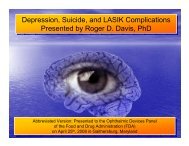12 Things You Should Know If You Are - LASIK Complications
12 Things You Should Know If You Are - LASIK Complications
12 Things You Should Know If You Are - LASIK Complications
You also want an ePaper? Increase the reach of your titles
YUMPU automatically turns print PDFs into web optimized ePapers that Google loves.
<strong>12</strong> <strong>Things</strong> <strong>You</strong> <strong>Should</strong> <strong>Know</strong> <strong>If</strong> <strong>You</strong> <strong>Are</strong> Considering Lasik Eye Surgery<br />
Page 4 of 7<br />
4. Ray Tsai, M.D., who was the leading Lasik surgeon in Taiwan, recently announced he would no<br />
longer do the procedure because he is seeing people developing serious complications 8-10 years<br />
after having had it done. According to the China Times, “Tsai said that many patients receiving<br />
Lasik surgery have suffered significant losses in eyesight 10 years after the surgery, suggesting<br />
that the surgery led to keratitis, inflammation of the cornea.” Tsai said it was a matter of<br />
medical ethics that he stop performing the procedure. But rather than immediately launching a<br />
retrospective study of patients who’d had Lasik performed ten or more years ago, which would<br />
have been both the ethical and medically correct thing to do, Lasik surgeons circled the wagons<br />
and have tried to label this doctor as a misguided alarmist, and to encourage potential Lasik<br />
customers to believe the fallacy that the procedure is perfectly safe.<br />
5. Lasik-Induced Dry Eye Disease (LIDED) is far more prevalent and in many cases far more<br />
painful and long-lasting than Lasik surgeons admit (I speak from personal experience in saying<br />
that LIDED can make reading, working at a computer, riding a bike, and a whole lot of other<br />
once pleasurable activities become physically miserable). Before the advent of Lasik less than<br />
20 years ago, the eye drop section of a department or grocery store was several bottles of Visine;<br />
today it’s an entire bank of shelves of different brands and varieties, some of which are marketed<br />
specifically to people who are suffering from painful dry eyes caused by Lasik. Lasik-Induced<br />
Dry Eye Disease has been a goldmine for the makers of the prescription eye drop Restasis,<br />
which is widely prescribed by Lasik surgeons for LIDED. Unfortunately, Restasis does not work<br />
for many people. It is also quite expensive.<br />
Special note for people with allergies: LIDED will make hay fever season even more miserable.<br />
6. The most common emotional downside of a bad Lasik outcome is depression. The problem is<br />
eloquently summarized at the Lasik Memorial website: “When [Lasik] complications occur, your<br />
life splits in two. There is the person you were before <strong>LASIK</strong>, and the person you are now... the<br />
person whose dry eyes hurt all the time, the person who sees multiple images of everything, who<br />
can’t drive at night, who can’t fulfill his or her responsibilities as a parent, or his or her potential<br />
as a human being, the person who suffers from PTSD, depression, and various states of dread<br />
about the future.” Dr. Roger Davis has written about what he calls “Refractive Surgery Shock<br />
Syndrome.” Anyone considering Lasik should watch the 5-minute video of his testimony and<br />
read through his slide presentation (the slides are intellectually challenging, but this is about<br />
the future of your eyes, so it’s a worthwhile investment of time).<br />
I’ve personally spoken with dozens of Lasik casualties and – without exception – every single one<br />
of them talks about being depressed. The most depressing consequence of my own Lasik<br />
misfortune has been prolonged sleep deprivation. Chronically sore and strained eyes make it



